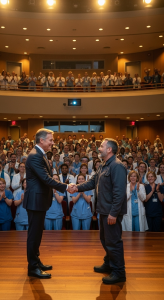The rhythmic squeak of Leo Martinez’s mop was the midnight heartbeat of St. Jude’s Medical Center. He was a man made of quiet diligence, a ghost in gray overalls who navigated the polished corridors long after the visitors had gone home and the daytime hustle had faded into a low, electronic hum. To most of the staff, he was just part of the scenery, as inanimate as the hand sanitizer dispensers he so meticulously wiped down.
But Leo saw everything. He saw the deepening exhaustion lines around the eyes of the good nurses, the ones who were now forced to cover two sections instead of one. He saw the flickering lights in the west wing that had been reported for weeks and the aging heart monitors that were becoming notorious for false alarms—or worse, for failing to alarm at all. The hospital, under Director Davenport’s mantra of “streamlined efficiency,” was slowly bleeding out.

Tonight, Leo was working the VIP floor. It was quieter here, the rooms more like hotel suites than hospital wards. He took a certain pride in his work, ensuring the floors reflected the overhead lights like a dark, still lake. He often exchanged a few kind words with the patients, many of whom were lonely and scared. It was a part of the job that wasn’t in his job description, a small act of humanity in an institution that was rapidly losing its own.
His last room for the hour was 412. The patient in there was a quiet man, admitted under the unassuming name of “John Smith.” He was frail but his eyes were sharp, observant. They followed Leo with a piercing intensity that was unnerving. Tonight, as Leo emptied the trash, the man spoke, his voice raspy. “You take great pride in your work, don’t you?”
Leo paused, surprised. “I try, sir. A clean floor is a safe floor.”
The man gave a weak nod. “A simple truth. So often forgotten.” That was all. But the exchange stuck with Leo. There was a weight to the man’s words that felt out of place.
An hour later, Leo was mopping the main corridor of the VIP wing. The silence was profound, broken only by the distant beep of machinery. As he passed room 412 again, a flicker of angry red from inside caught his eye. He glanced through the large glass window of the door. On the monitor above Mr. Smith’s bed, a critical warning was flashing. The patient’s oxygen saturation levels were plummeting. But the room was silent. The audible alarm had been turned off.
Mr. Smith’s chest was barely moving. His face had a bluish tint under the dim nightlight. Panic, cold and sharp, seized Leo. He abandoned his mop and rushed to the nurses’ station, his heart hammering against his ribs.
Brenda, the head nurse, was sitting behind the counter, the blue light of her phone illuminating her bored face. She looked up with annoyance as Leo approached, breathless.
“There’s a problem in 412! The monitor is red-lining, but the sound is off! I think he’s not breathing right!”
Brenda rolled her eyes, a sigh of profound irritation escaping her lips. She didn’t even bother to stand up. “Oh, for heaven’s sake, Leo. That’s the third time tonight that machine has acted up. It’s a piece of junk. Maintenance is supposed to look at it tomorrow.” She waved a dismissive hand. “Don’t bother us with this. Go back to your mopping.”
“But he looks…” Leo started, his voice pleading.
“Are you a doctor, Leo?” she snapped, her voice cold and sharp. “Are you a nurse? No. You’re the janitor. Now, leave the medical work to the professionals and do your job.”
Leo stood frozen for a second, Brenda’s condescending words ringing in his ears. He looked back down the hall at the silent, darkened room. He could follow orders. He could walk away. It would be the safe, easy thing to do. No one would ever blame the janitor.
But he couldn’t shake the image of Mr. Smith’s face, the memory of his sharp, intelligent eyes. He had made a promise to himself long ago: you always do the right thing, especially when it’s hard.
Ignoring Brenda’s glare, Leo turned and ran back toward room 412. His mind screamed at him to stop, that he was crossing a line he could never uncross. He didn’t care. He slammed his palm against the large, red Code Blue button on the wall next to the door.
Immediately, the hospital’s emergency alarm blared through the hallway. Within seconds, a team of doctors and nurses descended on the room, a whirlwind of controlled chaos. Leo was pushed aside, his job done. From the hallway, he watched as they worked frantically, intubating Mr. Smith and stabilizing him just in the nick of time. One of the doctors glanced out, saw Leo, and gave him a sharp, grateful nod. He had saved the man’s life.
The next morning, Leo was summoned to Director Davenport’s office. The room was cold and imposing, all dark wood and leather. Davenport sat behind his enormous desk, a man whose smile was as polished and empty as the floor in his lobby. Brenda stood beside him, her arms crossed, her expression a mask of vindictive triumph.
“Mr. Martinez,” Davenport began, his voice smooth as oil. “We have a report from Nurse Brenda about an incident last night. A report stating that you created a public disturbance, ignored a direct order from a superior, and interfered with hospital procedure.”
“But I saved his life,” Leo said, his voice quiet with disbelief. “The monitor was silent.”
“The monitor was faulty, a fact Nurse Brenda was aware of,” Davenport countered, the lie sliding effortlessly from his tongue. “Your reckless actions caused unnecessary panic and could have disrupted the care of other patients. We cannot tolerate such insubordination.”
Brenda smirked. It was a perfect cover-up. Blame the janitor. Blame the faulty equipment that management had refused to replace.
“Therefore,” Davenport said, leaning back with an air of finality, “your employment at St. Jude’s is terminated, effective immediately. Please collect your things and security will escort you out.”
For two weeks, Leo’s world was a gray fog of unemployment lines and rejected job applications. The official reason for his firing—insubordination—followed him like a shadow. He felt a despair so profound it was like a physical weight on his chest. He had done the right thing, and he had lost everything for it.
Meanwhile, in the VIP wing of St. Jude’s, John Smith was recovering. His real name was Alistair Harrison, a reclusive billionaire, a corporate raider so feared in the financial world they called him “The Shark.” He had checked in under an alias to avoid a media circus during a minor heart procedure. That minor procedure had almost become his obituary.
He was weak, but his mind was as sharp as ever. His ears, in particular, worked perfectly. From his bed, he heard the whispers between nurses. He heard Brenda bragging about how she and Davenport had “handled the situation.” He heard them talking about the “idiot janitor” who had gotten himself fired. He heard them complain about budget cuts and being overworked.
Alistair Harrison lay silently in his bed, connecting the dots. He wasn’t just a patient who had received substandard care; he was a systems analyst observing a catastrophic failure. The problem wasn’t just one lazy nurse. It was the entire corporate structure, a rot that started at the very top with Director Davenport and the board of OmniHealth, the parent corporation that owned St. Jude’s. They were prioritizing profits over patients. And they had tried to cover their fatal error by destroying an honest man.
He picked up the phone by his bedside. He didn’t call for a nurse. He called the head of his legal team. “I have a new project for us,” he said, his voice quiet but laced with steel. “I want you to start buying shares in OmniHealth. As many as you can, as quietly as you can. I’m initiating a hostile takeover.”
An email went out to the entire staff of St. Jude’s: MANDATORY ALL-HANDS MEETING. FRIDAY, 10 AM. GRAND AUDITORIUM. ATTENDANCE IS NOT OPTIONAL.
The hospital buzzed with rumors. Were there more budget cuts? Layoffs? The atmosphere in the auditorium was thick with anxiety. Leo Martinez received the email too, forwarded by a former colleague. He was hesitant to go, but a strange sense of curiosity, a need for closure, compelled him to attend. He stood at the very back of the packed room, feeling like a ghost at his own funeral.
Director Davenport walked onto the stage, his face pale and beaded with sweat. He tapped the microphone nervously. “Thank you all for coming,” he began, his voice trembling slightly. “As you know, our hospital is part of the larger OmniHealth corporation. And… well, there has been a recent and rather… abrupt change in leadership at the corporate level.”
He cleared his throat, unfolding a piece of paper with shaking hands. “It is my… duty, to introduce the new majority shareholder and chairman of the board of OmniHealth… who will be taking a direct, hands-on role with this hospital going forward.”
The large double doors at the side of the stage swung open.
Alistair Harrison walked in.
He was no longer the frail patient in a hospital gown. He was dressed in a razor-sharp, custom-tailored suit, radiating an aura of absolute power and authority. He was flanked by a team of stone-faced lawyers. A collective gasp rippled through the auditorium. Nurses and doctors who had treated “John Smith” stared in utter disbelief.
Davenport looked like he was about to faint. Brenda, who was sitting in the front row, turned white as a sheet.
Harrison walked calmly to the podium, adjusted the microphone, and surveyed the crowd with the cool, calculating eyes of a shark. “Good morning,” he said, his voice calm but resonant, filling the entire hall. “My name is Alistair Harrison. And as of 48 hours ago, I am the owner of this hospital, and every other asset under the OmniHealth umbrella.”
He let that sink in. The silence was absolute.
“My first act as the new owner is to implement some immediate and necessary personnel changes to improve our standard of patient care,” he continued, his eyes locking onto his targets. He looked directly at Davenport. “Director Davenport. For gross mismanagement, criminal negligence, and fostering a culture that places profit above human life, you are fired. Effective immediately.”
He then shifted his gaze to the front row. “Nurse Brenda. For abandoning your post, neglecting a patient in critical condition, and conspiring to cover up your incompetence by firing an innocent man… you are also fired. Security will escort you both off the premises. Your licenses will be challenged, and my legal team will be in touch regarding a civil suit.”
Shrieks of shock and murmurs of disbelief filled the room. Brenda and Davenport were frozen in their seats, utterly humiliated, utterly destroyed.
Harrison held up a hand for silence. “But my first act is not complete,” he said, his voice rising slightly. “A great institution is not built on directors or shareholders. It is built by people of integrity. People who do the right thing when no one is watching.”
He looked towards the back of the room, his eyes finding the one man he was looking for.
“And so, I would like to introduce you all to the new Head of Patient Safety and Quality Assurance for St. Jude’s Medical Center… Mr. Leo Martinez.”
Every head in the auditorium swiveled to the back. A path cleared as people turned to stare at the man in the worn-out jacket, who was looking around as if Harrison must be talking about someone else. The shock on Leo’s face was comical, then overwhelming.
“Mr. Martinez, please join me on stage,” Harrison commanded, a rare, small smile touching his lips.
Numbly, Leo walked down the aisle, the applause starting as a trickle and then building into a thunderous roar. His former colleagues, the ones who had pitied him, the ones who had ignored him, were now on their feet, cheering for the janitor who had brought down a corrupt system. As he stepped onto the stage, Harrison shook his hand firmly.
In the months that followed, Leo, with Harrison’s full backing, transformed St. Jude’s. He implemented an anonymous reporting system where any employee, from a surgeon to a kitchen porter, could report safety concerns without fear of retribution. He fought for and secured funding for new equipment and increased staffing. He walked the halls not as a ghost, but as a guardian, his new suit as immaculate as his old overalls, his purpose clearer than ever.
He and Alistair Harrison often had lunch together in the hospital cafeteria, the billionaire and the former janitor, planning the future. Leo had not only gotten his job back; he had been given the power to ensure that what happened to him, and what almost happened to Alistair, would never happen again. He was a hero, not because he was special, but because he was an ordinary man who, when faced with a choice between what was easy and what was right, had the courage to choose right.




